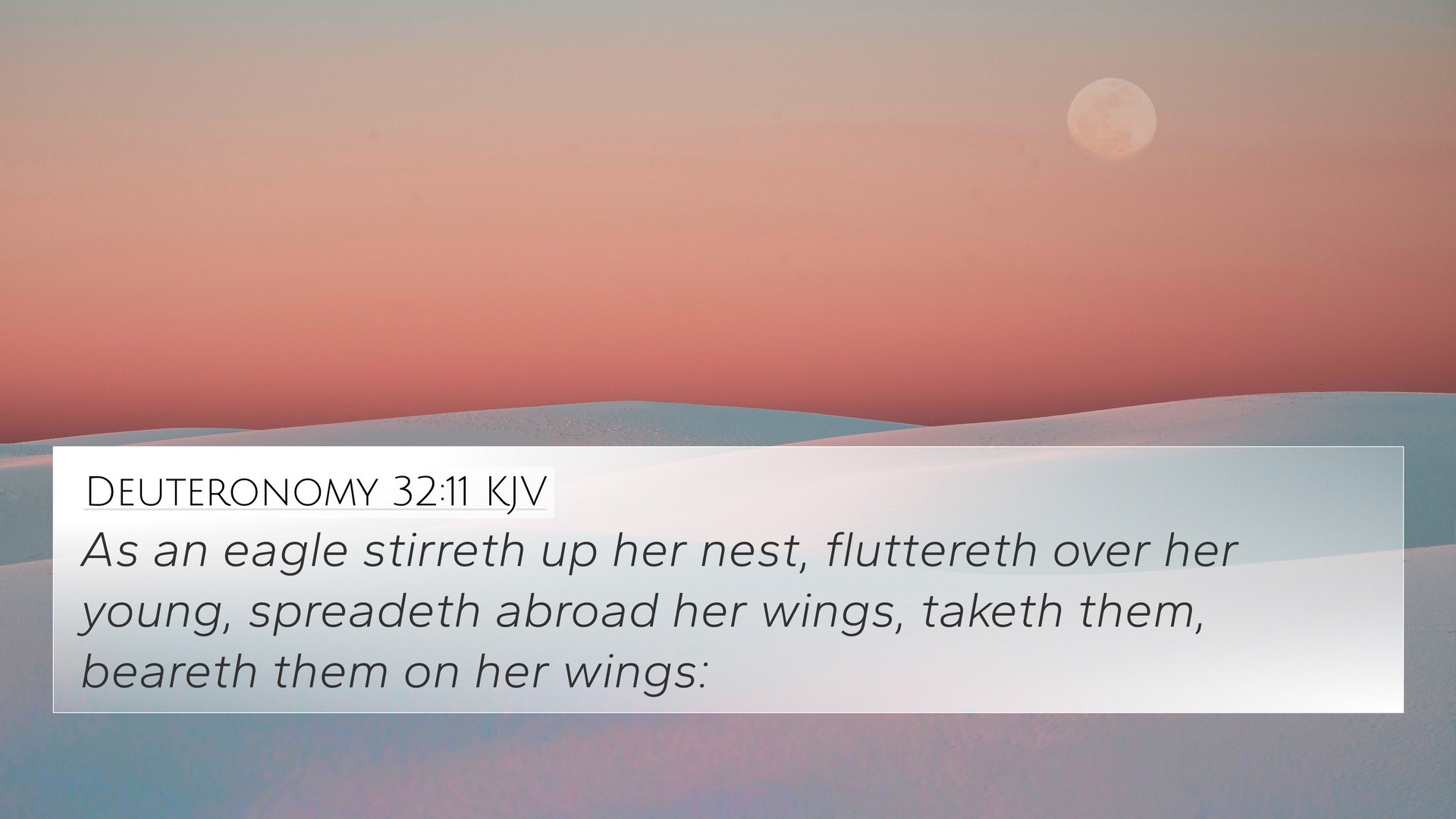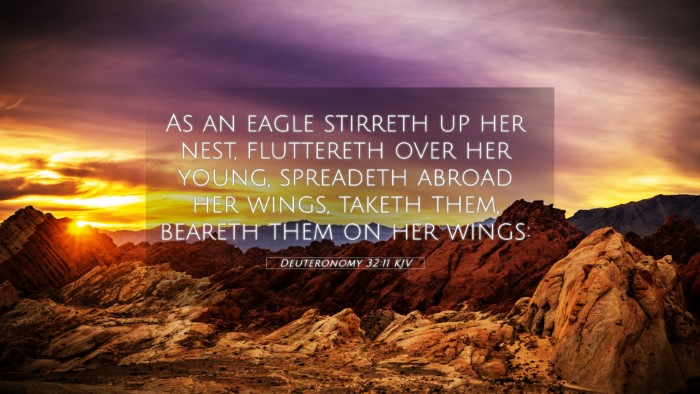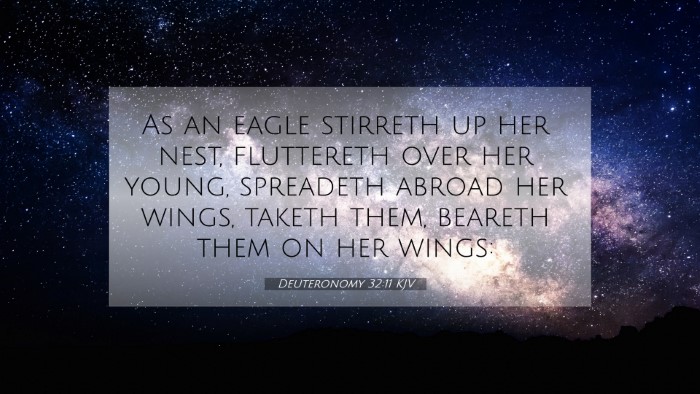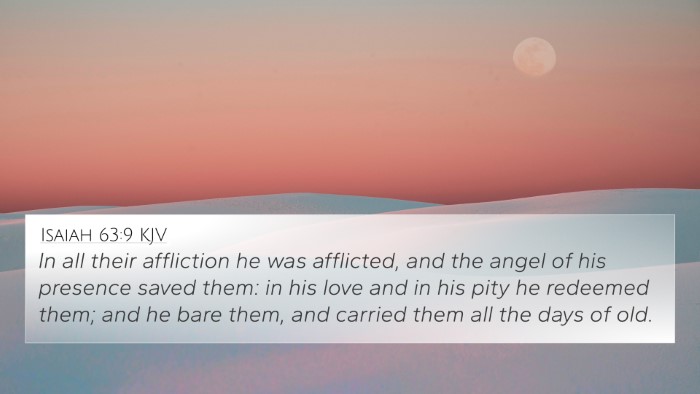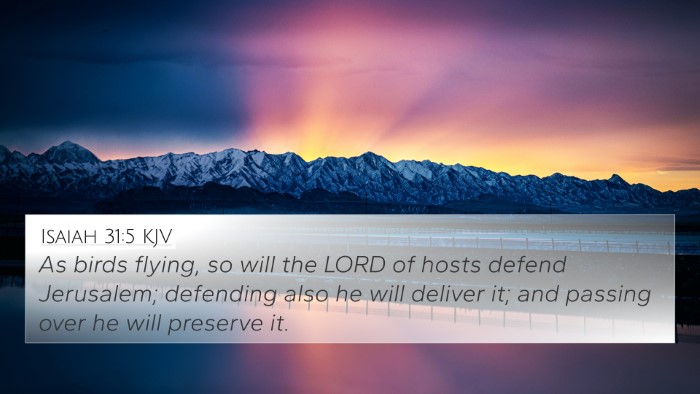Understanding Deuteronomy 32:11
Bible Verse: Deuteronomy 32:11 - "As an eagle stirs up her nest, flutters over her young, spreads abroad her wings, taketh them, beareth them on her wings."
This verse uses the metaphor of an eagle to illustrate God's protective and nurturing nature towards His people. The imagery of the eagle is significant; it reflects strength, protection, and the instinctual drive to care for its young. The act of stirring the nest represents God's initiative to encourage growth and independence in His children.
Commentary Insights
-
Matthew Henry:
Henry emphasizes the nurturing aspect of God, portraying Him as a mother eagle who tends to her young with great care. He notes that the eagle's flight represents God’s guidance. The stirring of the nest refers to preparing the young for the challenges of life outside the nest.
-
Albert Barnes:
Barnes elaborates on the protective nature of God, suggesting that just as an eagle bears her young, God bears His people through their trials and tribulations. He draws parallels between the eagle's ability to fly high and God's power to elevate us above our circumstances.
-
Adam Clarke:
Clarke provides additional insights on the preparation and training process of the young eagle. He likens this to God’s way of preparing His people for their life's journey, emphasizing that spiritual maturity comes through trials and challenges.
Bible Verse Cross-References
Several verses within the Bible connect with the themes found in Deuteronomy 32:11:
- Exodus 19:4 - "Ye have seen what I did unto the Egyptians, and how I bare you on eagles' wings, and brought you unto myself."
- Psalms 91:4 - "He shall cover thee with his feathers, and under his wings shalt thou trust: his truth shall be thy shield and buckler."
- Isaiah 40:31 - "But they that wait upon the Lord shall renew their strength; they shall mount up with wings as eagles; they shall run, and not be weary; and they shall walk, and not faint."
- Matthew 23:37 - "O Jerusalem, Jerusalem, thou that killest the prophets, and stonest them which are sent unto thee, how often would I have gathered thy children together, even as a hen gathereth her chickens under her wings, and ye would not!"
- Hosea 11:4 - "I drew them with cords of a man, with bands of love: and I was to them as they that take off the yoke on their jaws, and I laid meat unto them."
- 1 Peter 5:7 - "Casting all your care upon him; for he careth for you."
- Romans 8:31-32 - "What shall we then say to these things? If God be for us, who can be against us?"
Thematic Bible Verse Connections
The themes of protection, care, and guidance found in Deuteronomy 32:11 are prevalent throughout the Scriptures. Below are some insights into these connections:
- Protection: The metaphor of wings is common in the Bible, symbolizing divine safety and refuge, as seen in Psalms 91:4.
- Guidance: The eagle's flight can be seen as a representation of God's leading us, highlighted in Isaiah 40:31 where believers are promised renewed strength.
- Care: God's nurturing nature is further reflected in Matthew 23:37 and Hosea 11:4, where He expresses His desire to gather and care for His people.
Comparative Bible Verse Analysis
Through comparative analysis, believers can deepen their understanding of Deuteronomy 32:11 by exploring the similarities and contrasts in the narratives of the aforementioned verses. For example:
- Exodus 19:4 showcases God’s historical action in carrying the Israelites, establishing a direct correlation between divine protection and care.
- Isaiah 40:31 captures the idea of empowerment through waiting upon the Lord, aligning with the themes of nurturing and readiness found in Deuteronomy 32:11.
- Matthew 23:37 offers a poignant reminder of God’s longing for His people, complementing the image of an eagle in Deuteronomy.
How to Use Bible Cross-References
Utilizing a bible cross-reference system can enhance Bible study by revealing intricate connections between scriptures. Here are some tools and methods:
- Use a Bible concordance to locate key themes and verses that relate.
- Explore a cross-reference Bible study guide to find comprehensive links between different books of the Bible.
- Participate in cross-referencing Bible study methods that encourage dialogue and exploration of connections.
In conclusion, Deuteronomy 32:11 serves as a profound reminder of the protective and nurturing nature of God, illustrated through powerful imagery. By engaging in inter-Biblical dialogue through cross-referencing, believers can deepen their understanding and appreciation of God’s care across the Scriptures.
